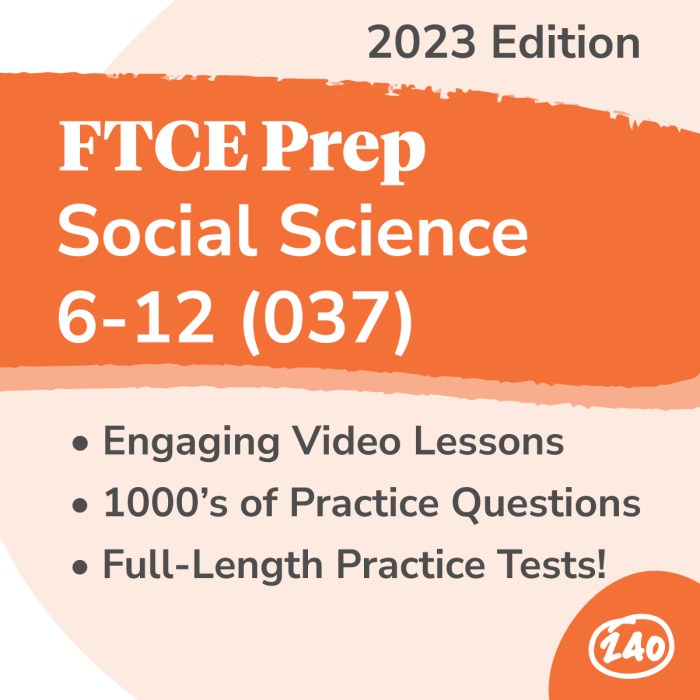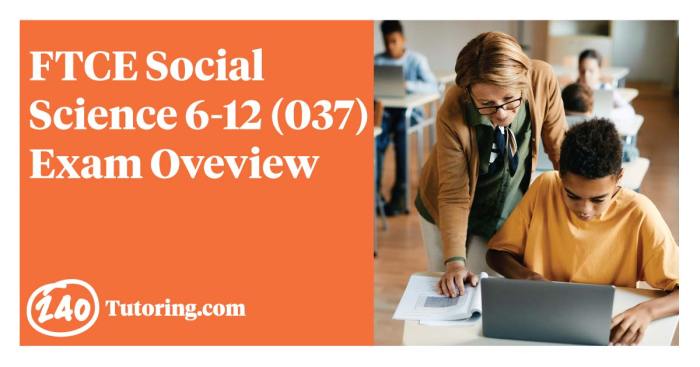Ftce social science 6 12 – Prepare yourself for an extraordinary journey into the realm of FTCE Social Science 6-12, where knowledge reigns supreme and success awaits those who dare to conquer it. With a keen eye for detail and a passion for unraveling the intricacies of our world, this comprehensive guide will equip you with the tools you need to excel on this pivotal exam.
Delve into the depths of history, geography, economics, civics, and more as we navigate the content areas and subareas that define this exam. Discover the secrets to effective test-taking strategies, harness the power of practice questions, and gain access to a treasure trove of study resources that will propel you towards your academic goals.
FTCE Social Science 6-12 Exam Overview

The Florida Teacher Certification Examinations (FTCE) Social Science 6-12 exam assesses the knowledge and skills of prospective social science teachers in Florida. Passing this exam is a requirement for obtaining a teaching certification in social science for grades 6 through 12 in the state.
The FTCE Social Science 6-12 exam consists of 120 multiple-choice questions that cover four content areas:
Content Areas
- World History (30%)
- U.S. History (30%)
- Geography (20%)
- Civics/Government (20%)
Each content area is further divided into subareas, which are listed below:
World History Subareas
- Ancient Civilizations
- Middle Ages
- Early Modern Period
- Modern Period
- Global Interactions
U.S. History Subareas, Ftce social science 6 12
- Colonial Era
- Revolutionary Era
- Antebellum Period
- Civil War and Reconstruction
- Industrial Revolution
- Progressive Era
- World Wars and the Cold War
- Contemporary Era
Geography Subareas
- Physical Geography
- Human Geography
- Environmental Geography
- U.S. Geography
- World Geography
Civics/Government Subareas
- Foundations of American Government
- Structure and Functions of Government
- Political Processes
- Civil Liberties and Civil Rights
- International Relations
To pass the FTCE Social Science 6-12 exam, candidates must achieve a scaled score of 220 out of 300. Additionally, candidates must meet the eligibility requirements set by the Florida Department of Education, which include holding a bachelor’s degree from an accredited institution and completing an approved teacher preparation program.
Content Areas and Subareas

The FTCE Social Science 6-12 exam covers four main content areas, each with its own subareas and percentage on the exam.The following table provides an overview of the content areas, subareas, percentage on the exam, and a brief description:
| Content Area | Subarea | Percentage on Exam | Description |
|---|---|---|---|
| World History | Ancient Civilizations | 15% | Covers the history of ancient civilizations, including Mesopotamia, Egypt, Greece, and Rome. |
| Medieval and Early Modern World | 15% | Covers the history of the medieval and early modern world, including the Middle Ages, the Renaissance, and the Reformation. | |
| Modern World | 15% | Covers the history of the modern world, including the Enlightenment, the Industrial Revolution, and the 20th century. | |
| U.S. History | Early American History | 15% | Covers the history of the United States from its colonial origins to the Civil War. |
| Modern American History | 15% | Covers the history of the United States from the Civil War to the present. | |
| Geography | Physical Geography | 10% | Covers the physical features of the Earth, including landforms, climate, and vegetation. |
| Human Geography | 10% | Covers the human aspects of the Earth, including population, culture, and economics. | |
| Geographic Methods | 5% | Covers the methods used to study geography, including maps, globes, and remote sensing. | |
| Government/Civics | Foundations of Government | 10% | Covers the basic principles of government, including the three branches of government, the Bill of Rights, and the Constitution. |
| Political Processes | 10% | Covers the political processes of the United States, including elections, political parties, and interest groups. |
Study Resources

Preparing for the FTCE Social Science 6-12 exam requires a comprehensive approach. Various study materials are available to help you succeed. Here’s a curated list of recommended resources:
Textbooks:
- FTCE Social Science 6-12 Exam Secrets Study Guideby Mometrix
- FTCE Social Science 6-12 Teacher Certification Examby Exam Sam
- Florida Teacher Certification Exam for Social Science 6-12: Study Guide and Practice Questionsby Test Prep Books
Online Courses:
- FTCE Social Science 6-12 Exam Preparationby Study.com
- FTCE Social Science 6-12 Test Prepby Udemy
- FTCE Social Science 6-12 Certification Courseby Florida Virtual School
Practice Tests:
- FTCE Social Science 6-12 Practice Testby Florida Department of Education
- FTCE Social Science 6-12 Practice Examby Mometrix
- FTCE Social Science 6-12 Practice Questionsby Test Prep Books
Official Resources:
- Florida Department of Education: FTCE Social Science 6-12 Exam
- Pearson VUE: FTCE Social Science 6-12 Exam
Free or Low-Cost Materials:
Passing the FTCE Social Science 6-12 exam is a significant milestone for aspiring social studies educators. For those seeking further professional development, exploring resources like MCAS 2022 Math Grade 10 can provide valuable insights into teaching strategies and curriculum development.
By incorporating these resources into their pedagogical toolkit, educators can enhance their ability to foster a deep understanding of social sciences in their students.
- Khan Academy: History and Social Studies
- Crash Course: History and Government
- Quizlet: FTCE Social Science 6-12 Flashcards
Test-Taking Strategies: Ftce Social Science 6 12

Conquering the FTCE Social Science 6-12 exam requires a strategic approach. Here are some effective test-taking strategies to help you maximize your score.
Time Management
- Preview the Exam:Before starting, quickly skim the entire exam to get an overview of the question types and time allotted for each section.
- Allocate Time Wisely:Determine the approximate time you can spend on each question based on its point value and difficulty level.
- Use a Timer:Set a timer to track your progress and avoid overspending time on any one question.
Pacing
- Start with Easier Questions:Begin with questions you’re confident about to build momentum and reduce anxiety.
- Skip Challenging Questions:If you encounter a difficult question, mark it and move on to easier ones to avoid wasting time.
- Return to Marked Questions:Once you’ve completed the easier questions, return to the skipped ones and allocate the remaining time to them.
Question-Answering Techniques
Multiple Choice Questions
- Read the Question Carefully:Understand the question and the answer choices before selecting.
- Eliminate Obvious Incorrect Answers:Cross out answers that are clearly wrong or irrelevant.
- Consider All Options:Read all answer choices before making a selection, even if you think you know the answer.
Essay Questions
- Plan Your Response:Before writing, Artikel your main points and supporting evidence.
- Organize Your Answer:Use clear paragraphs and transitions to guide the reader through your response.
- Provide Specific Examples:Support your arguments with relevant historical examples, data, or theories.
Sample Questions

To provide a comprehensive understanding of the FTCE Social Science 6-12 exam, let’s explore a range of sample questions that reflect the diverse content areas covered in the assessment. Each question is categorized by type, accompanied by a sample question, and followed by a detailed explanation of the correct answer.
The sample questions are carefully designed to showcase the depth and breadth of the exam’s content, ensuring that candidates have a thorough understanding of the subject matter.
Multiple Choice
| Question Type | Sample Question | Answer Explanation |
|---|---|---|
| Multiple Choice | Which of the following is a key principle of the U.S. Constitution? | A. Separation of powers B. Divine right of kings C. Absolute monarchy D. Rule of law |
| Multiple Choice | What was the primary cause of the American Revolution? | A. British taxation policies B. French interference C. Spanish aggression D. Native American resistance |
| Multiple Choice | Which of the following is a major characteristic of a free market economy? | A. Private ownership of property B. Centralized planning C. Government control of prices D. Absence of competition |
Short Answer
| Question Type | Sample Question | Answer Explanation |
|---|---|---|
| Short Answer | Describe the key differences between the Articles of Confederation and the U.S. Constitution. | – Articles of Confederation: Weak central government, no executive or judicial branches, states retained most power – U.S. Constitution: Strong central government, three branches of government (executive, legislative, judicial), limited powers for states |
| Short Answer | Explain the significance of the Louisiana Purchase in American history. | – Doubled the size of the United States – Opened up new territories for settlement and expansion – Strengthened the nation’s economy and military |
| Short Answer | Discuss the impact of the Industrial Revolution on American society. | – Urbanization, rise of factories, mass production, economic growth, social inequality |
Essay
| Question Type | Sample Question | Answer Explanation |
|---|---|---|
| Essay | Analyze the causes and consequences of the Civil War. | – Causes: Slavery, economic differences, states’ rights – Consequences: End of slavery, reunification of the Union, significant social and economic changes |
| Essay | Evaluate the role of the United States in international affairs during the 20th century. | – World War I, World War II, Cold War, United Nations, global leadership |
| Essay | Discuss the challenges and opportunities facing American democracy in the 21st century. | – Globalization, technology, economic inequality, political polarization, immigration |
Popular Questions
What is the purpose of the FTCE Social Science 6-12 exam?
The FTCE Social Science 6-12 exam assesses the knowledge and skills of candidates seeking certification to teach social sciences in grades 6-12 in Florida.
What are the content areas covered on the exam?
The exam covers five content areas: World History, US History, Geography, Economics, and Civics/Government.
What is the passing score for the exam?
The passing score for the exam is 200 out of 300 points.
Where can I find official study materials for the exam?
Official study materials are available on the Florida Department of Education website.